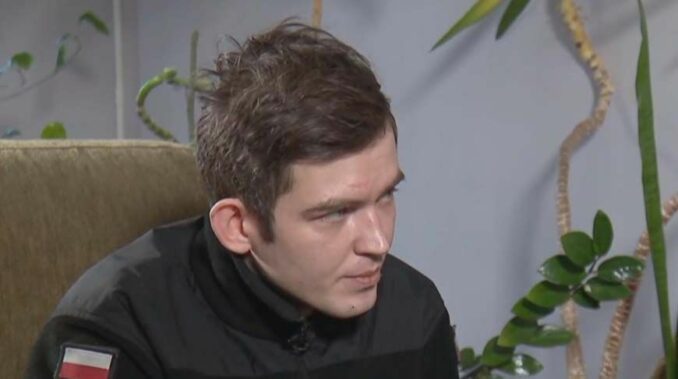Polish soldier deserts, charges army with killing migrants
Polish soldier Emil Czeczko, who was serving on the border under orders to prevent migrants from crossing from Belarus into Poland, fled through a barbed wire fence on Dec. 17 and appealed for asylum in Belarus. In a television interview, Czeczko said he fled because Polish troops had shot and killed some of the migrants. He said he opposed this policy.

Polish soldier Emil Czeczko tells of shooting migrants at border with Belarus. Credit: BelTA
Czeczko said that special border troops forced him and other regular Polish soldiers to take part in the executions. He also told BelTa TV that two Polish volunteers, civilians who had come to aid the migrants, were killed when they tried to intervene. (tinyurl.com/29zmtkau)
The migrants fly to Minsk, Belarus, mainly from Syria, Afghanistan, Iraq and Yemen, in an attempt to migrate to the European Union because their families cannot survive at home. Scenes of Polish troops setting up barbed wire and firing water cannons to stop them were broadcast on television worldwide starting in mid-November.
Czeczko’s accusation that Polish forces used lethal force against the migrants sparked demands from Belarusian and Russian government representatives for an international investigation by the United Nations or human rights organizations related to his charges. They accused the Polish government of refusing to answer questions about the border incidents.
U.S.- and NATO-led or supported wars in the migrants’ origin countries have created an unlivable situation for millions of people. U.S.-imposed sanctions continue to squeeze the economies of these countries.
The EU has erected barriers to migrants trying to survive. Hundreds of migrants die each year attempting to cross the Mediterranean Sea when their overloaded boats sink. Others die crossing borders.
Poland is a NATO member, beholden to U.S. and EU imperialism, and serving them by obstructing migration and providing military bases that threaten Belarus and Russia. Poland’s reactionary government represses opponents and persecutes anyone who defends communism. New statues have been erected of historic Polish fascist officers.
Czeczko speaks out
The following quote is of excerpts from a report of Czeczko’s interview on BelTa TV, published Dec. 17 in the English section of the Belarus news agency eng.belta.by. During the interview, Emil Czeczko was asked how those people [migrants] behaved before the execution, whether they said anything at that moment. “I am sorry, I do not want to talk about it. Some were crying; others were screaming. Some were just standing straight,” he replied.
Another question related to whether they had to “finish off” the wounded. Emil Czeczko said, “I heard that there were people who had to be finished off. And what else could be done; should they have been buried alive? They said: finish them off!”
Commenting on the information that he was caught drunk driving some time ago, the Polish serviceman said with sarcasm: “Right, I fled through the barbed wire, because my license was taken away. A great story! Well, yes, an ordinary drunkard . . . As I have said, soldiers were given a huge amount of alcohol every time they were forced to take part in it. And then they said I was driving under the influence of alcohol.”
As BelTA reported, the Polish serviceman said during the interview that at some point, cars with border guards began to arrive at his place of service and take his fellow soldiers with them. Emil Czeczko and another serviceman were taken first. On the way, they were offered a drink.
When they got there, they saw several people. “One of them asked another border guard whether he should reload the weapon. And when we asked what for, they told us to reload our weapons and pointed their guns at our heads to force us to shoot. We were drunk while patrolling the border for the first time. We caught some man who was by himself, took him to the forest, dug a hole and right in front of our eyes, the border guards shot him in the head,” Czeczko said.
According to Emil Czeczko, volunteers and migrants were among those who were killed by Polish border guards. He said he witnessed at least two situations when Polish border guards shot a volunteer for asking them where they were taking refugees to. “There was not a single case when the migrants we brought were not killed. We would always kill them.”
Catalinotto is the author of “Turn the Guns Around: Mutinies Soldier Revolts and Revolutions” about rank-and-file GI opposition to the U.S. role in Vietnam. We do not know at present if there is widespread opposition among Polish soldiers in carrying out punitive duties against civilians.

